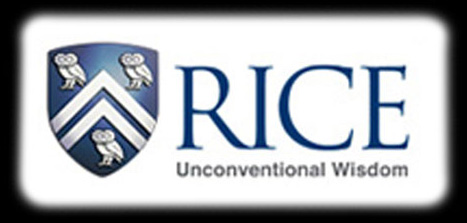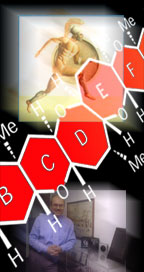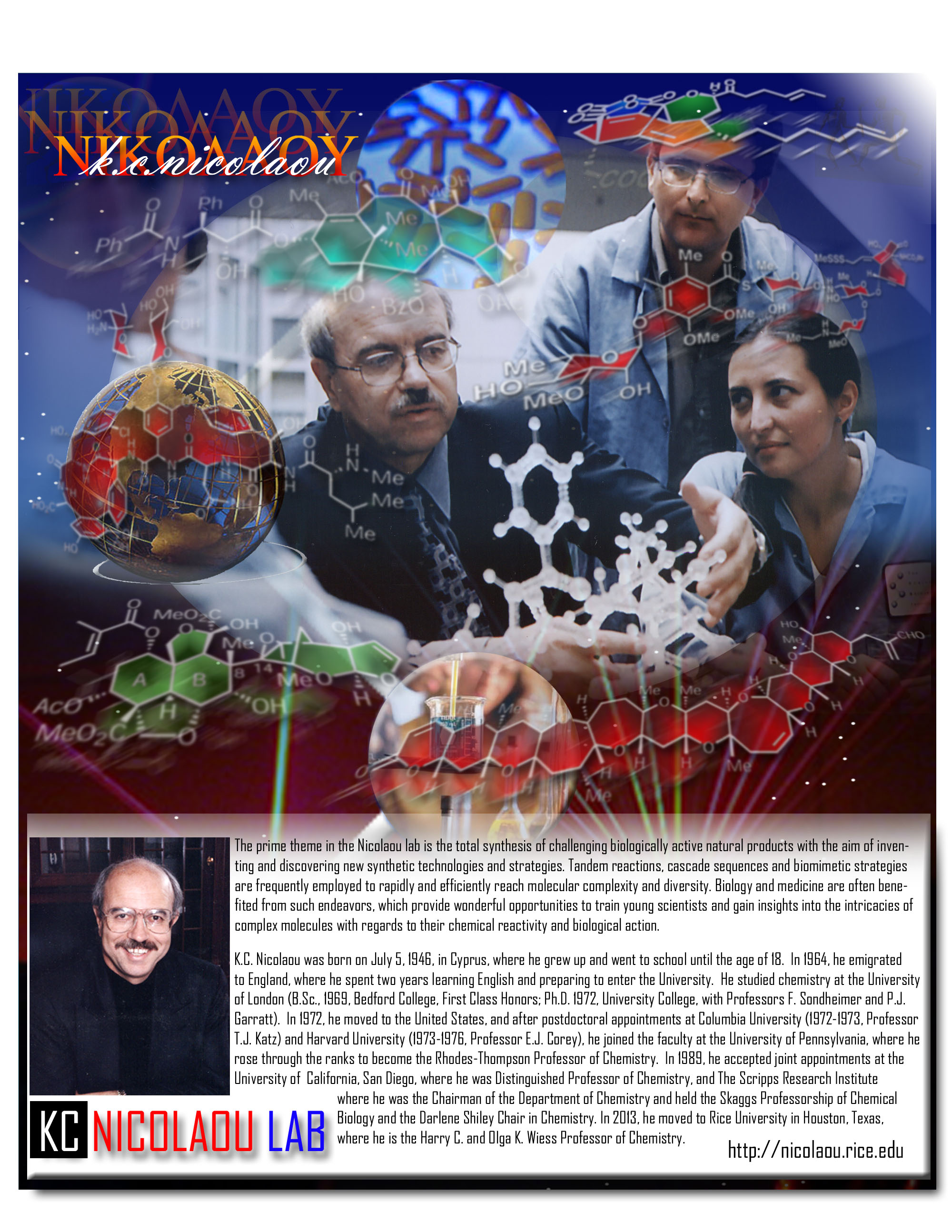
Click here to see the pdf version of the image above.
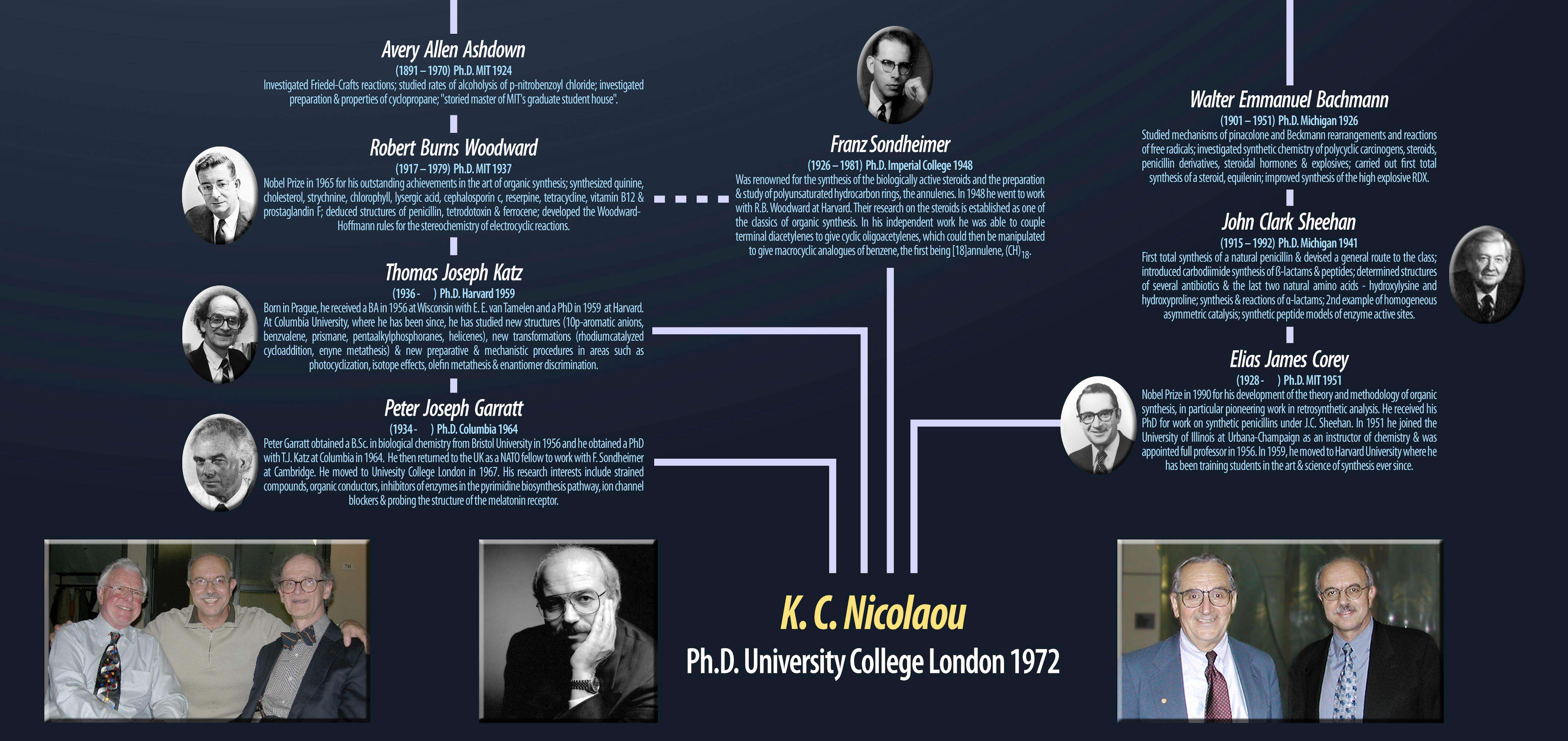
Click here to see the full image of KCN's Scientific Geneaology above.
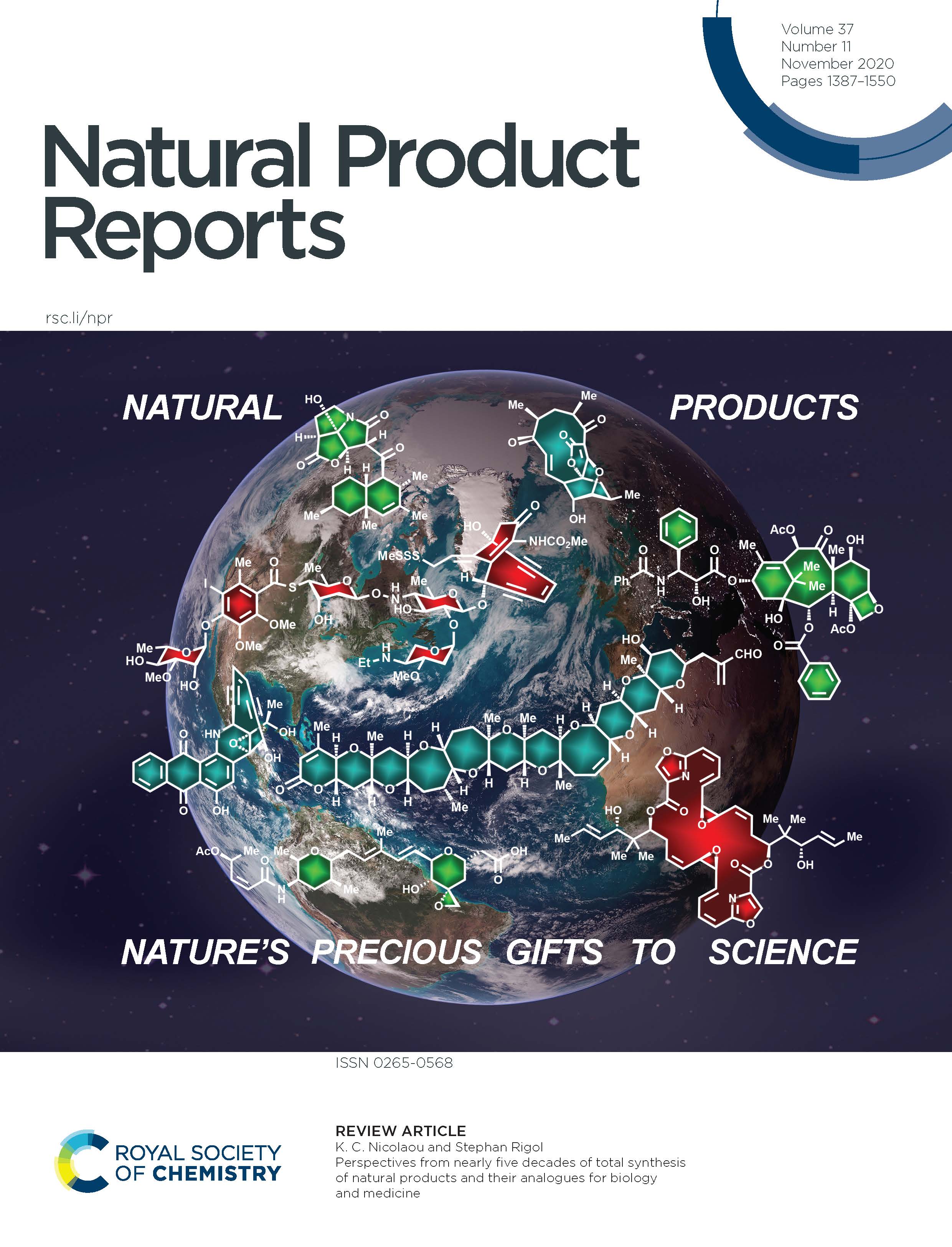
Cover page of Natural Product Reports (Royal Society of Chemisty), Volume 37, November 2020, Pages 1387-1550.
Click here to read the NPR review article.
K.C. Nicolaou
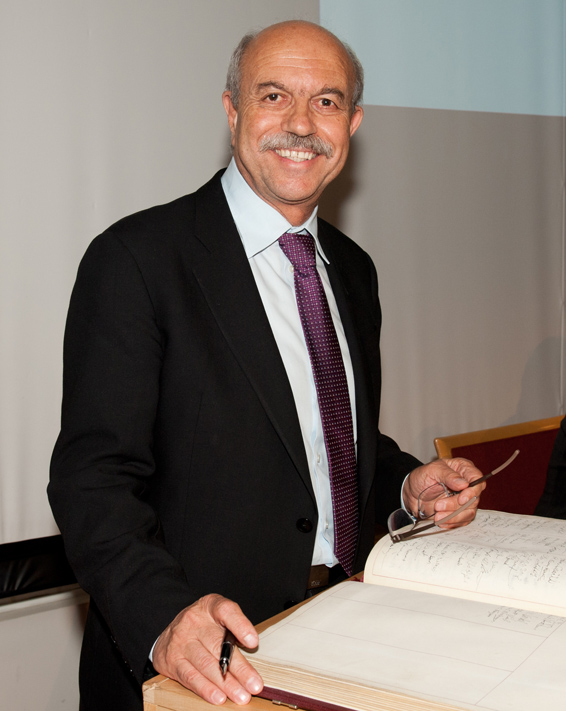
Brief career background, research interests and selected awards and honors
Kyriacos Costa (K.C.) Nicolaou was born on July 5, 1946 in Karavas, Cyprus, where he attended school until the age of 13. He then moved to Nicosia to attend the Pancyprian Gymnasiuum. In 1964, he emigrated from Cyprus to England where he spent two years learning English and preparing to enter the university. His advanced studies in chemistry were carried out at the University of London (B.Sc., 1969, Bedford College, First Class Honors; Ph.D. 1972, University College, with Profs. F. Sondheimer and P.J. Garratt). In 1972, he crossed the Atlantic to the United States and completed postdoctoral appointments at Columbia University (1972–1973, Prof. T.J. Katz) and Harvard University (1973–1976, Prof. E.J. Corey) after which he joined the faculty at the University of Pennsylvania, where he rose through the ranks to become the Rhodes-Thompson Professor of Chemistry. In 1989, he accepted joint appointments at the University of California, San Diego, where he was Distinguished Professor of Chemistry, and The Scripps Research Institute, where he served as the Founder and Chairman of the Department of Chemistry and held the Darlene Shiley Chair in Chemistry and the Aline W. and L. S. Skaggs Professor of Chemical Biology in the Department of Chemistry. From 2003 to 2009, he concurrently served as the Founder and Director of the Chemical Synthesis Laboratory at A*STAR, Biopolis in Singapore. From 2012-2014, he was Visiting Professor at Chongqing University, China. In May 2013, Dr. Nicolaou joined Rice University as the Harry C. and Olga K. Wiess Professor of Chemistry in the BioScience Research Collaborative.
Nicolaou’s research efforts over the years elevated the art and science of total synthesis to higher levels of molecular complexity and diversity through innovative synthetic strategies and technologies. He synthesized almost two hundred naturally occurring molecules and thousands of designed analogs—perhaps more than any other in the history of this discipline. This distinction is all the more impressive in that his accomplishments cover almost all-important classes of bioactive molecules, whether one classifies them by structure or activity. He was the first to synthesize Taxol, the clinically used antitumor drug.
Nicolaou developed the theme of practicing organic synthesis with method development and applying it to biology and medicine from the basic to the translational, thereby establishing a new paradigm for total synthesis of natural products. Thus, from its original purpose of confirming the structure of the natural product, the practice of total synthesis evolved to being a fine art, then placed on systematic scientific foundation through retrosynthetic analysis, and now as a means to enable biology and medicine—all along without losing its identity and self-advancement. Nicolaou’s contributions played a profound role in bringing about this game-changing transformation of the art and science of total synthesis, while achieving its advancement to its present sharp state.
For his scientific work, Professor Nicolaou has received numerous awards and honors, including the Humboldt Foundation US Senior Scientist Prize (Germany, 1987), the A.C. Cope Scholar Award, American Chemical Society (1987), the Award for Creative Work in Synthetic Organic Chemistry, American Chemical Society (1993), the Dr. Paul Janssen Prize for Creativity in Organic Synthesis, Janssen Research Foundation (Belgium, 1994), the Rhone-Poulenc Medal, Royal Society of Chemistry (U.K., 1995), the William H. Nichols Medal, New York Section-American Chemical Society (1996), the Inhoffen Medal, Gesellschaft fur Biotechnologische Forschung mbH (GBF) (Germany, 1996), the Ernest Guenther Award in the Chemistry of Natural Products, American Chemical Society (1996), the Chemical Pioneer Award, American Institute of Chemists (1996), the Linus Pauling Medal, Oregon, Portland, Puget Sound Sections-American Chemical Society (1996), the Decoration of the Order of the Commander of Honor Medal (bestowed by the President of Greece, 1998), the Gustavus John Esselen Award for Chemistry in the Public Interest, Northeastern Section-American Chemical Society (1998), the Yamada Prize (Japan, 1999), the first Aspirin Prize for Solidarity through Chemistry (Spain, 1999), the Max Tishler Lecture Prize, Harvard University (2000), the Paul Karrer Gold Medal, Universität Zürich (Switzerland, 2000), the Centenary Medal, Royal Society of Chemistry (U.K., 2000–2001), the Ernst Schering Prize, Ernst Schering Research Foundation (Germany, 2001), the Nagoya Gold Medal of Organic Chemistry, Nagoya University (Japan, 2001), Tetrahedron Prize for Creativity in Organic Chemistry (2002), the ACS Nobel Laureate Signature Award for Graduate Education in Chemistry (2003), the Aristeio Bodossaki Prize (Greece, 2004), the A.C. Cope Award, American Chemical Society (2005) Auburn-G. M. Kosolapoff Award, Auburn Section-American Chemical Society (2006), the Burkardt-Helferich Prize (Germany, 2006), the ISHC Senior Award in Heterocyclic Chemistry (2007), the August-Wilhelm-von-Hofmann-Denkmünze Award (Germany, 2008), the Chandler Medal, Columbia University (2008), Lampousa Lifetime Achievement Award (Cypriot American Association) (2009); the Science Award, Ministry of Education and Culture, Cyprus (2010), the Benjamin Franklin Medal in Chemistry (2011), the Rolf Sammet Guest Professorship (Germany, 2014), the Nemitsas Prize (Cyprus, 2014), the Einstein Professorship (China, 2014), the ‘MAN of the Year’ Award (Cyprus, 2015), Scientist of the Year Award (Cyprus, 2015), Phileleftheros Award (Cyprus, 2015), the Wolf Prize (Israel, 2016); Chemistry Europe (formerly ChemPubSoc Europe, CPSE) Fellowship (Class of 2016-2017), European Union, 2018; Robert Koch Gold Medal, Robert Koch Foundation, 2021; and selected as one of 63 Greek Pioneers in Medicine and Biomedical Sciences, ARISTEiA Institute, 2021.
Nicolaou is a Member of the New York Academy of Sciences (1987), Fellow of the American Academy of Arts and Sciences (1993), Member of the National Academy of Sciences (USA, 1996), Fellow of the American Association for the Advancement of Science (1999), Corresponding Member of the Academy of Athens (Greece, 2001), Honorary Fellow of the Indian Academy of Sciences (2007), Honorary Member of the Israel Chemical Society (2009), Member of the German Academy of Sciences Leopoldina (2009), Honorary Life Fellow of the Singapore National Institute of Chemistry (2011), Member of the American Philosophical Society (2011), Foreign Member of the Royal Society of London (2013), Member of The Academy of Medicine, Engineering & Science of Texas (2013), Member of the National Academy of Inventors (2015) and Fellow of the Royal Society of Chemistry (2017). He holds 10 honorary degrees from universities around the world, including one from The University of Cyprus.
He is the author or co-author of over 800 scientific articles, reviews, and book chapters, 76 patents, and six books, including the popular Classics in Total Synthesis co-authored with his student E.J. Sorensen (1996, VCH), Classics in Total Synthesis II co-authored with his student S.A. Snyder (2003, Wiley-VCH), Classics in Total Synthesis III co-authored with his student J.S. Chen (2011, Wiley-VCH), Molecules that Changed the World, co-authored with his research associate T. Montagnon (2008, Wiley-VCH) and The Peripatetic Chasing the Molecules of Nature (2021, Amazon KDP Publishing). His dedication to chemical education is evidenced by his training of hundreds of graduate students and postdoctoral fellows and the hundreds of lectures he gave in more than 30 countries around the world.
Contact Information
